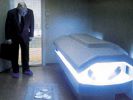Eye For Film >> Movies >> Songs From The Second Floor (2000) DVD Review

Songs From The Second Floor
Reviewed by: Anton Bitel
Read Anton Bitel's film review of Songs From The Second FloorWhile the 15 minutes of excerpts from Andersson's first features A Swedish Love Story (1970) and Gilliap (1975), from his short films Something Happened (1987) and World Of Glory (1991), and from Songs From The Second Floor (2000) itself, offer an excellent gauge of the way that Andersson's aesthetic style has progressed through the years, there is nothing new here, given that the exact same featurette was also included on Artificial Eye's DVD releases of A Swedish Love Story and You, The Living.
The other extras here, however, really bring this disc into its own. Two behind-the-scenes featurettes, The Making Of The Burnt Furniture Scene (12 minutes) and The Making Of The Magician Scene (three minutes), show the set construction, make-up, blocking, rehearsals, physical effects and direction that contributed to these single-take sequences from the film. With economic editing in place of commentary, we see these elaborate scenes evolve in Andersson's studio before our very eyes – and also see that his sets, unlike the fictive locations that they represent, are places of happiness and laughter.

Best of all is the 26-minute featurette Obsessions From The Second Floor, which traces the film's gestation over several decades(!), in parallel with the emergence of Andersson's singular approach to filmmaking, and the painstaking way in which he allows his scenes to develop organically from endless test runs and rehearsals with a variety of personnel – a process that is only possible for a fully independent studio set-up like his own.
We learn that more than 1000 young actors were auditioned for the part of the poet, before Andersson finally decided, mid-production, to make him a silent character. Andersson himself, speaking in English, discusses his feelings about history, guilt and the Holocaust; and reveals (with depressing evidence to hand) that the sequence involving the hanged brother and sister is a reconstruction of a historical event, captured in a 1942 photograph that has haunted him ever since he first saw it as a teen. A wealth of test footage affords real insight into the complexity of Andersson's unique filmmaking process, making this extras well nigh unmissable extra for anyone who has enjoyed the main feature.
Reviewed on: 24 Mar 2011
















